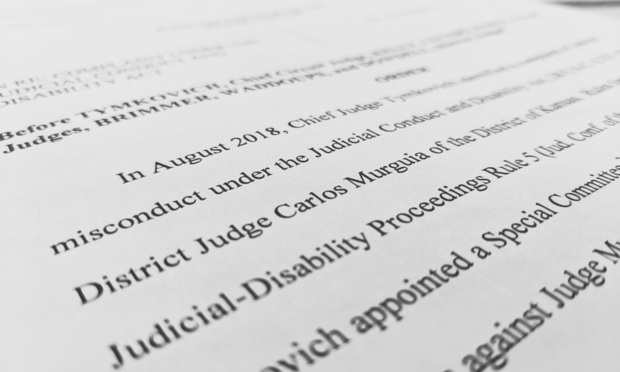Judiciary Reprimands Kansas Federal Judge for Sexually Harassing Court Employees
The public reprimand is the most severe sanction available to the judicial council.
September 30, 2019 at 06:30 PM
3 minute read
 U.S. District Judge Carlos Murguia of the District of Kansas was publicly reprimanded by the Judicial Council of the Tenth Circuit.
U.S. District Judge Carlos Murguia of the District of Kansas was publicly reprimanded by the Judicial Council of the Tenth Circuit.
A federal judge in Kansas was publicly reprimanded Monday for misconduct that included sexually harassing court employees and other "inappropriate behavior."
The Judicial Council of the U.S. Court of Appeals for the Tenth Circuit, chaired by Circuit Chief Judge Timothy Tymkovich, held that U.S. District Judge Carlos Murguia sexually harassed employees, engaged in an extramarital relationship with a felon who was then on probation, and was "habitually" tardy for court engagements.
A public reprimand is the most severe sanction available to the council. The order said evidence and facts associated with the misconduct allegations "are insufficient" to recommend that Murguia be impeached.
An order signed by Tymkovich said the council reached its conclusions after an extensive investigation that included interviews with 23 people and a hearing at which Murguia testified under oath.
Murguia admitted the misconduct allegations, apologized for his behavior and promised he would not engage in any inappropriate conduct in the future. He also offered to take any recommended voluntary corrective actions.
The committee "found no evidence that his misconduct continued" after he was served with the initial complaint.
But the committee determined that Murguia "was less than candid" when initially confronted with the allegations and "did not fully disclose the extent of his conduct."
"He tended to admit to allegations only when confronted with supporting documentary evidence," the order said. "His apologies appeared more tied to his regret that his actions were brought to light than an awareness of, and regret for, the harm he caused to the individuals and to the integrity of his office."
Murguia was appointed by President Bill Clinton in 1999. His sister, Mary Murguia, is a judge on the U.S. Court of Appeals for the Ninth Circuit who was also appointed by Clinton.
The council determined that Carlos Murguia "gave preferential treatment and unwanted attention" to female judicial employees, and engaged in "sexually suggestive comments, inappropriate text messages, and excessive non-work-related contacts, much of which occurred after work hours and often late at night."
The federal judicial Code of Conduct bars judges from engaging "in any form of harassment of court personnel."
Women subjected to harassment told council investigators they were reluctant to tell Murguia to stop "because of the power he held as a federal judge."
The order also said Murguia's "years-long sexual relationship" with the felon, who is now back in prison for probation violations, placed the judge "in such a compromised position that he made himself susceptible to extortion."
The relationship violated federal judicial ethics canons because "reasonable minds" could conclude the judge's "honesty, integrity, impartiality, temperament, or fitness to serve as a judge is impaired," the order said.
The council also chastised Murguia's habitual tardiness for court proceedings, often requiring attorneys, parties and juries to wait and sometimes making lawyers late for other judicial proceedings. A repeated cause of Murguia's tardiness was his "regularly scheduled lunchtime basketball games" on days when he had scheduled hearings or trials. According to the order, Murguia was counseled repeatedly about his tardiness "fairly early in his federal judicial career," but his conduct "persisted never-the-less."
Read the order:
This content has been archived. It is available through our partners, LexisNexis® and Bloomberg Law.
To view this content, please continue to their sites.
Not a Lexis Subscriber?
Subscribe Now
Not a Bloomberg Law Subscriber?
Subscribe Now
NOT FOR REPRINT
© 2025 ALM Global, LLC, All Rights Reserved. Request academic re-use from www.copyright.com. All other uses, submit a request to [email protected]. For more information visit Asset & Logo Licensing.
You Might Like
View All
NLJ 500 Firm Seeks 20-Day Extension for Restaurant Client's Injunction Compliance

'Pay What Is Owed': State Appellate Court Affirms $19M Verdict for Software Contractor
5 minute read

Class Action Accusing Dave's Killer Bread of Mislabeling Protein Contents Cleared to Continue, Judge Rules
4 minute readTrending Stories
Who Got The Work
J. Brugh Lower of Gibbons has entered an appearance for industrial equipment supplier Devco Corporation in a pending trademark infringement lawsuit. The suit, accusing the defendant of selling knock-off Graco products, was filed Dec. 18 in New Jersey District Court by Rivkin Radler on behalf of Graco Inc. and Graco Minnesota. The case, assigned to U.S. District Judge Zahid N. Quraishi, is 3:24-cv-11294, Graco Inc. et al v. Devco Corporation.
Who Got The Work
Rebecca Maller-Stein and Kent A. Yalowitz of Arnold & Porter Kaye Scholer have entered their appearances for Hanaco Venture Capital and its executives, Lior Prosor and David Frankel, in a pending securities lawsuit. The action, filed on Dec. 24 in New York Southern District Court by Zell, Aron & Co. on behalf of Goldeneye Advisors, accuses the defendants of negligently and fraudulently managing the plaintiff's $1 million investment. The case, assigned to U.S. District Judge Vernon S. Broderick, is 1:24-cv-09918, Goldeneye Advisors, LLC v. Hanaco Venture Capital, Ltd. et al.
Who Got The Work
Attorneys from A&O Shearman has stepped in as defense counsel for Toronto-Dominion Bank and other defendants in a pending securities class action. The suit, filed Dec. 11 in New York Southern District Court by Bleichmar Fonti & Auld, accuses the defendants of concealing the bank's 'pervasive' deficiencies in regards to its compliance with the Bank Secrecy Act and the quality of its anti-money laundering controls. The case, assigned to U.S. District Judge Arun Subramanian, is 1:24-cv-09445, Gonzalez v. The Toronto-Dominion Bank et al.
Who Got The Work
Crown Castle International, a Pennsylvania company providing shared communications infrastructure, has turned to Luke D. Wolf of Gordon Rees Scully Mansukhani to fend off a pending breach-of-contract lawsuit. The court action, filed Nov. 25 in Michigan Eastern District Court by Hooper Hathaway PC on behalf of The Town Residences LLC, accuses Crown Castle of failing to transfer approximately $30,000 in utility payments from T-Mobile in breach of a roof-top lease and assignment agreement. The case, assigned to U.S. District Judge Susan K. Declercq, is 2:24-cv-13131, The Town Residences LLC v. T-Mobile US, Inc. et al.
Who Got The Work
Wilfred P. Coronato and Daniel M. Schwartz of McCarter & English have stepped in as defense counsel to Electrolux Home Products Inc. in a pending product liability lawsuit. The court action, filed Nov. 26 in New York Eastern District Court by Poulos Lopiccolo PC and Nagel Rice LLP on behalf of David Stern, alleges that the defendant's refrigerators’ drawers and shelving repeatedly break and fall apart within months after purchase. The case, assigned to U.S. District Judge Joan M. Azrack, is 2:24-cv-08204, Stern v. Electrolux Home Products, Inc.
Featured Firms
Law Offices of Gary Martin Hays & Associates, P.C.
(470) 294-1674
Law Offices of Mark E. Salomone
(857) 444-6468
Smith & Hassler
(713) 739-1250








